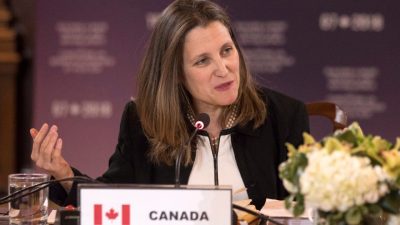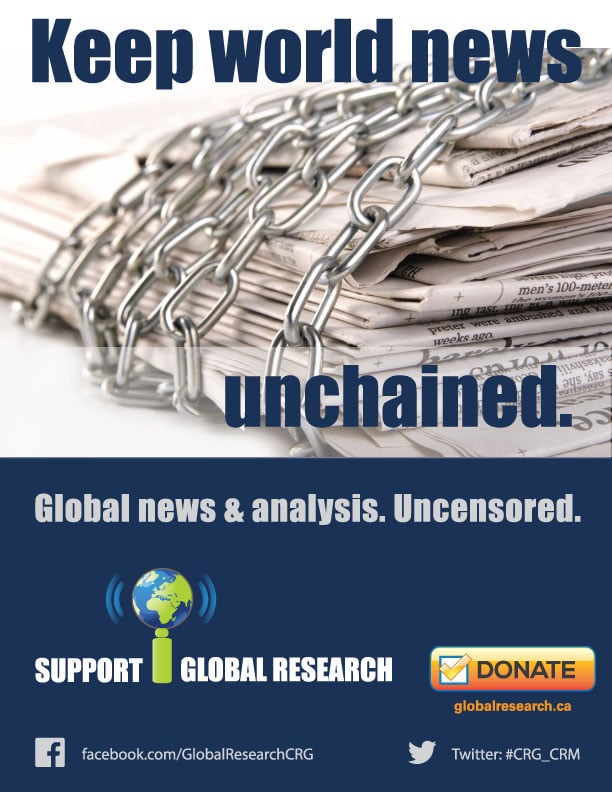Chrystia Freeland Fails to See that It Is a Multipolar World on the March, Not Authoritarianism

In a strange case of reversed roles Canadian Minister of Foreign Affairs, Chrystia Freeland, tried to convince US president Donald Trump to return to his lost path of globalization and international trade agreements in an impassionate speech she gave at the Foreign Policy Forum last June 13 in Washington D.C.
Ms. Freeland seems to have a good reputation in some circles in Washington. At least enough to get her centre stage and a nomination as “diplomat of the year.” Though she should know that the recognition she received was not meant to acknowledge necessarily her achievements but rather to use her as an “international voice” on behalf of some US sectors that dissent with Donald Trump’s foreign policy – more specifically, those aspects of US foreign policy that are perceived to hurt business such as international trade and tariffs. Ms. Freeland obliged and that was precisely the focus of her speech.
We don’t know the impact that Ms. Freeland’s speech has had on Donald Trump. But her message would have been fitting had she been on the same stage with the likes of Ronald Reagan whom she did praise once.
What we do know is that her speech – probably meant to be inspirational – was full of liberal, capitalist and imperial rhetoric, and showed little understanding of the geopolitical realities of today. Her tenacious defense of the virtues of capitalism lacked vision and placed her right back at the time of the old Cold War with the only exception of authoritarianism being the nemesis instead of communism. She pointed her accusatory finger at Venezuela, Russia and China as examples of current unruly countries that do not follow her image of international order.
So, no one should fear that Chrystia Freeland’s “mano-a-mano” retort to Donald Trump’s mischief towards Prime Minister Justin Trudeau at the G7 meeting means a deep fissure in Canada-US relations. On the contrary, hers was an exaltation of the common goal the two countries share, albeit with tactical differences:
“the fight for liberal democracy and the international rules-based order that supports it.”
By “international” she obviously meant North American.
Ms. Freeland made a strong defense of “liberal democracy” that others cannot question in her fading world. But she never noticed the contradiction that a forced liberal democracy is in fact authoritarianism of the worst kind. If democracy needs a Canadian or US stamp of approval, then it stops being a democracy. Democracy by definition is based on people’s free decisions, not on imposed decisions, much less on foreign imposed decisions.
In a very revealing – but not surprising – colonial language, she showed a concern that
“within the club of wealthy Western nations, we are seeing homegrown anti-democratic forces on the rise.”
And again, she failed to link that concern to her own grim admission that “Middle-class working families are not wrong to feel left behind. Wages have been stagnating. Jobs are becoming more precarious, pensions uncertain, housing, childcare, and education harder to afford.” She simply justified it by saying that
“these are the wrenching human consequences, the growing pains” of righteous liberal democracies.
She went on to say,
“Liberal democracy is also under assault from abroad. Authoritarian regimes are actively seeking to undermine us with sophisticated, well-financed propaganda and espionage programs.”
An obvious reference to Russia. In fact she did refer specifically to Venezuela’s “authoritarianism” and to Russia’s move “backwards” from “democratic capitalism.”
Her reductionist view that reproducing a patched up worn out capitalist system will make new friends despite the evidence to the contrary is quite shocking.
Ms. Freeland was in total denial failing to recognize that it is not authoritarianism that is “on the march,” but it is a new multipolar world on the march to replace the North American-centered unipolar world of the 20th century.
China and Russia are leading the way successfully towards reducing the domination of a Western liberal consensus in world affairs. China is doing that with its Silk Road Economic Belt as a development strategy that focuses on connectivity and cooperation between Eurasian countries and possibly beyond. Russia is using a no less effective strategic approach by using its soft power building new alliances and balancing the conflicting forces, especially in the Middle East, with an eye to a positive relationship with the European Union. This spells danger to the diminishing might of the US and its ally from the North, Canada.
In concluding, in the new upcoming world order countries can come with their different systems willing to form alliances and work together, be it China’s communism, Venezuela’s 21st century socialism, or Russia’s balancing soft power to deescalate major conflicts and bring competitors together.
It is shortsighted to admit that a one-fits-all liberal democracy is not perfect and to ignore that other nations assert the right to try their own social system, willing to fail and try again without foreign interference. Freeland doesn’t grasp the importance that other nations attribute to trying on their own, being sovereign in solving their own problems and being respected.
Ms. Freeland, assertion of the right to freely and peacefully choose our own destiny is not authoritarianism. Your desire to shape the world to your image is. Your definition of authoritarianism is someone else’s sovereignty.
We have to acknowledge that there was one statement Ms. Freeland made that we have to agree on, “You [the US] may feel today that your size allows you to go mano-a-mano with your traditional adversaries and be guaranteed to win. But if history tells us one thing, it is that no one nation’s pre-eminence is eternal.”
In other words, empires fall.
But then we are left wondering why is Canada pursuing a close ties with a falling empire instead of embracing an emerging multipolar world?
*
Nino Pagliccia is an activist and writer based in Vancouver, Canada. He is a Venezuelan-Canadian who writes about international relations with a focus on the Americas. He is editor of the book “Cuba Solidarity in Canada – Five Decades of People-to-People Foreign Relations” http://www.cubasolidarityincanada.ca. He is a frequent contributor to Global Research.
 Can you help us keep up the work we do? Namely, bring you the important news overlooked or censored by the mainstream media and fight the corporate and government propaganda, the purpose of which is, more than ever, to “fabricate consent” and advocate war for profit.
Can you help us keep up the work we do? Namely, bring you the important news overlooked or censored by the mainstream media and fight the corporate and government propaganda, the purpose of which is, more than ever, to “fabricate consent” and advocate war for profit.
We thank all the readers who have contributed to our work by making donations or becoming members.
If you have the means to make a small or substantial donation to contribute to our fight for truth, peace and justice around the world, your gesture would be much appreciated.

